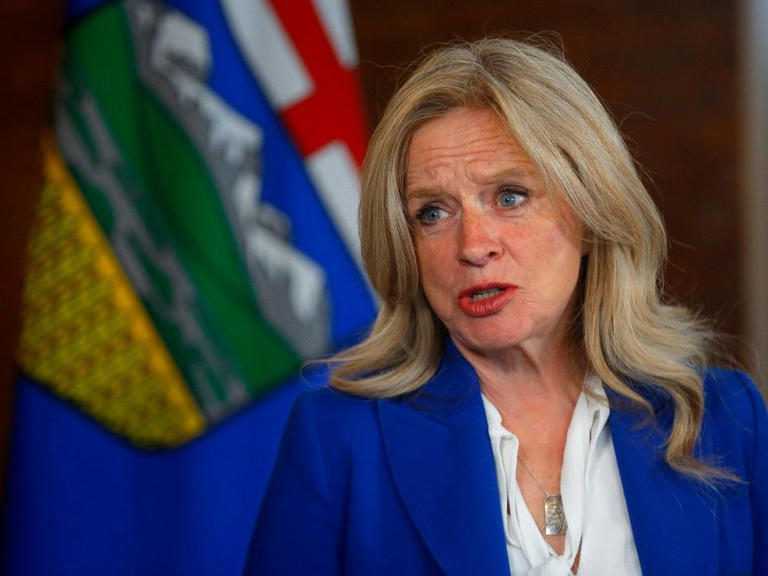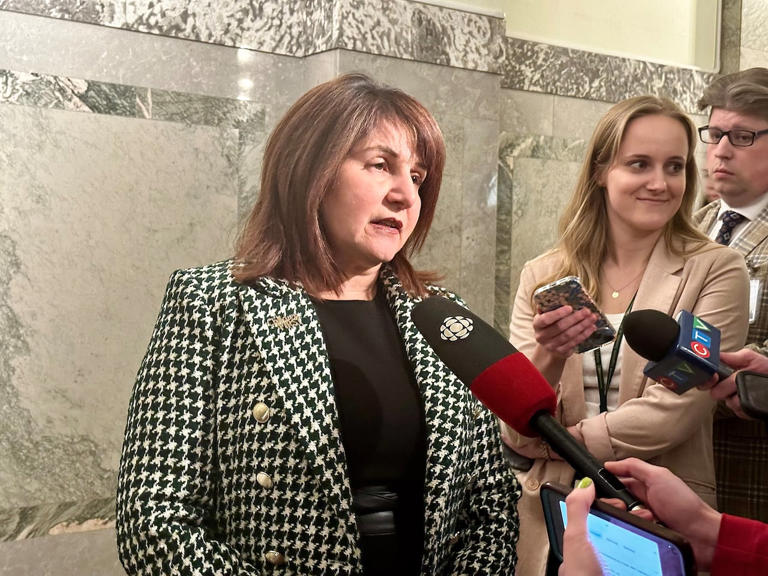Story by Lisa Johnson • Edmonton Journal

Alberta NDP Leader Rachel Notley.© Darren Makowichuk
Alberta’s Opposition NDP is demanding the government restore and increase minimum hours of care for residents in continuing care facilities.
New regulations, passed through a cabinet order on Feb. 28 and set to take effect April 1 , no longer include any government direction for how much time residents must receive direct personal or nursing care.
NDP Leader Rachel Notley said at a news conference Tuesday residents don’t have any legal guarantee of minimum standard.
“The red tape that they’re trying to eliminate is actually the fundamental basic protection that Alberta families are looking for for their loved ones,” said Notley.
The previous regulations, which date back to 1985, included a requirement that each operator has “to provide an average of at least 1.9 paid hours of combined nursing and personal services per resident per resident day in (a) nursing home.” Twenty-two per cent of that care had to be provided by nurses.
Notley said the standard was already too low, and should be increased to at least match Ontario’s standard, which in 2023 increased required hours per day per patient to four. The Health Standards Organization has said residents should get at least four hours of direct care each day.
The United Nurses of Alberta also flagged the elimination of the requirements in a statement Tuesday.
“We are moving to zero hours of care. This is extremely dangerous,” said UNA president Heather Smith.
Health Minister Adriana LaGrange, answering questions from NDP continuing care critic Lori Sigurdson during a budget estimates committee meeting Tuesday, said the province funds an average of 3.62 hours of care per day per resident.
“(It) is significantly improved upon from what was existing previously in the 1.9 hours in the nursing home operations regulation,” said LaGrange, who also pointed out the government has increased wages for health care aids by $2 per hour.
Taking more heat during question period, LaGrange said the previous regulations were outdated, and the government did “extensive” consultations before changing them.
“We heard that changes were needed to provide better flexibility and to allow the operators to develop staffing plans that really meet the needs of not just their facilities, but also their patients’ unique needs,” she said.
Notley suggested that flexibility will undermine Alberta’s health care system.
“After COVID, we learned that continuing care is in crisis and private operators regularly cut corners to make a profit. This government wants to actually increase the opportunity for that to happen at the same time that they’re introducing discretionary standards,” said Notley in the assembly.
“They’re going from law to discretion.”
Dismantling AHS: Continuing care a mounting concern as Albertans age
The government’s move comes after the UCP commissioned a 2021 report that recommended a boost to daily hours of care , which would mean hiring more staff.
At a news conference last week announcing the government’s efforts to create more continuing care spaces and lessen pressure on hospital beds, Feisal Keshavjee, chairman of the Alberta Continuing Care Association, said operators have increased hours of care.
“The workforce has to be there to deliver it, so we’re working in lockstep and the regulations will help solidify that, but we’ve got to make sure that as the legislation comes out, we actually have the workforce,” he said.
Although there is a shortage of staff in continuing care facilities, the government’s latest effort to attract workers to the province with incentives left out health care workers.
Sigurdson said there is a high rate of absenteeism and vacancies among health care aides who do low-paid work, and the government needs to better support those workers, including with full-time positions with full benefits.
lijohnson@postmedia.com
X: @reportrix
Alberta health minister says 'proper procedures' were followed for patient taken to hotel instead of care home
Story by Julia Wong • CBC
Alberta's minister of health is defending the province's health authority after a senior with high care needs who had been expecting to be moved to a care home was instead taken to a hotel.
Minister Adriana LaGrange said she was "very concerned" when asked about an exclusive CBC News story that detailed how Blair Canniff, 62, was taken to a hotel south of Edmonton after spending months in the Royal Alexandra Hospital, as he recovered from a stroke.
Canniff uses a wheelchair and is paralyzed on his left side.
In early March, he said he was told that he would be moving to a long-term care facility and was not given any other options. Then, he said, on March 4, he was put in a taxi that took him to a Travelodge in Leduc, roughly 35 kilometres south of Edmonton.
"My understanding is that AHS [Alberta Health Services] followed their proper procedures. They did discharge to a non-profit provider and you would have to ask the non-profit provider why they chose that site," LaGrange said on Monday.

Adriana LaGrange answers questions from CBC at the Alberta Legislature on Monday. (Kory Siegers/CBC)© Provided by cbc.ca
When pressed by CBC News on whether those guidelines were appropriate and the right thing to do, LaGrange reiterated that AHS followed its discharge guidelines, where a team of healthcare workers work with an individual to determine where is an appropriate place to send the patient.
Concern for patient
Canniff's family told CBC News last week that they had been worried about his his mobility issues and his ability to care for himself, and said he had been given fast food to eat.
After a week at the hotel, Canniff said he was sent back to the hospital on March 11 with no explanation; he has since been re-admitted.
Minister of Seniors, Community and Social Services Jason Nixon said that his office is "most definitely" looking into the situation.
"We want to make sure everybody ends up in a safe space," he said on Monday.
Canniff said the organization in charge of the program at the hotel was Contentment Social Services, which can be found in the province's non-profit listings.
Before the story aired Friday and was published online Saturday, CBC News went to an address listed on Contentment Social Services's website but found it was a mailing address.
CBC News called two numbers associated with the non-profit multiple times, texted one of those numbers three times and sent several emails requesting an interview and comment for this story. As of Monday, CBC News has not heard back.

Jason Nixon answers questions from CBC News at the Alberta Legislature on Monday. (Kory Siegers/CBC)© Provided by cbc.ca
"My department doesn't provide any funding to that organization and I have instructed my department to make sure that's the case," Nixon said.
'Highway healthcare'
NDP Leader Rachel Notley called the situation a sad state of affairs.
"It's highway healthcare ending up at motel medicine," she said on Monday.
"It's a sign that the management of our healthcare is in great crisis and that we need more beds, publicly-run beds in Edmonton."
When told about the health minister's comments that AHS followed the guidelines, Notley said LaGrange should apologize.
"The guidelines are clearly ridiculous and need to be redone," Notley said.
Have any tips on this story? Contact reporter Julia Wong at julia.wong@cbc.ca.

No comments:
Post a Comment